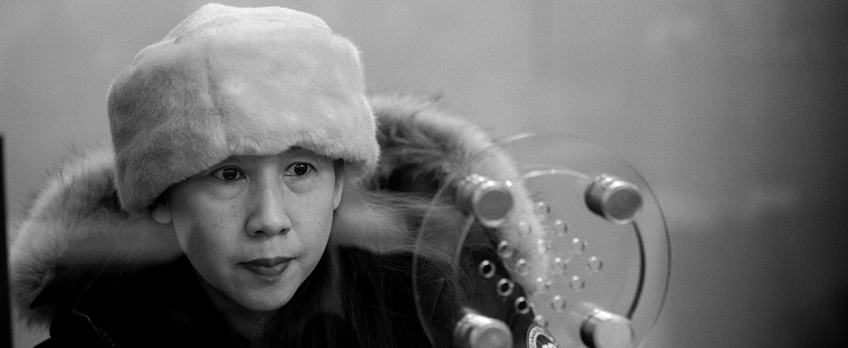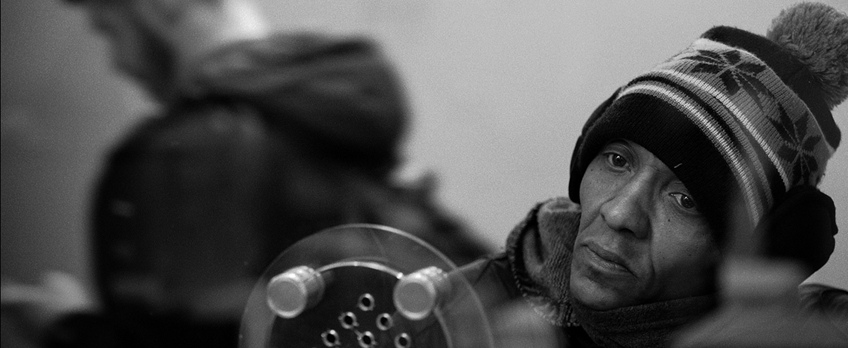Moments Found in Film: An Interview with Jean-François Lesage

In Prayer for a Lost Mitten, French-Canadian director Jean-François Lesage explores the themes of loss, melancholy and nostalgia amid a Montreal winter. The documentary follows a set of visitors to a Metro station’s lost-and-found office, where they speak about the things they wish they could find again.
Critics Campus 2020 participant Jack Rowland speaks to Lesage about the process of shaping his film – which screens as part of the MIFF 68½ program – and the techniques he uses to create atmosphere.
Jack Rowland: I want to start off with the selection process for the subjects. From what I understand, you shot in the lost-and-found office for a few days and selected your subjects from there?
Jean-François Lesage: Well, I wanted to make a film about loss, and the longing to get back something that you have lost. The characters of my films, they’re always people that I meet randomly and they’re all kinds of people. I don’t try to find very exotic characters. You can make a documentary film about absolutely anybody.
Because this was about loss, I thought: Okay, I’m going to go to the lost-and-found office and I will film the interaction, and then I will ask people if I can follow them in their life for two months. Maybe they will first talk about something very material that they lost – but as we go along, and as they know us better, the conversation could [become] more about immaterial loss.
Your film is set entirely at night, as was your earlier film A Summer Love (2015). Does night-time hold a special significance for you as a filmmaker?
There’s something that I like about shooting at night. There’s only one film that I did so far that is not shot at night – it’s shot in end-of-the-day kind of light. But what I like about shooting night is that you can take 50 nights of shooting and it can look like the same night. It’s more complicated if you shoot during the daytime.
Night is very atmospheric, and I like artificial lighting like neons, like streetlights, the light of a cell phone on someone’s face. There’s something I really like about the look of things at night.

Prayer for a Lost Mitten
Some of the colours you captured in A Summer Love – the contrast between the shadows in the park and the really bright, saturated greens – create quite a dreamy atmosphere.
For me, atmosphere is even more important than narrative. Really, the narrative is an excuse to try and create an atmosphere.
I don’t work with actors – I work with real people. I’m trying to create an atmosphere with the words of people [from] all walks of life, ordinary people, but without necessarily a big traditional dramatic axis.
For Mitten, I thought, This is about loss. I have a difficult relationship with the winter in my country. It’s really a challenge every year: it’s tough and it’s really cold. Everything is lost during a winter night because everything is covered by large amounts of snow, so that’s why I focused on the winter nights for this one.
One of the most atmospheric things about Mitten is Tom Brunt’s music. How did you come across him, and was the decision to put jazz in the film an early one?
It was an early decision. I wanted the film to be nostalgic, but fully assuming the nostalgia, so that’s why I went for the black-and-white. There are great films like some John Cassavetes or Louis Malle films – or, in Quebec, we have Gilles Groulx – with amazing jazz soundtracks, and these films are all in black-and-white. So I wanted jazz, and I had a specific tune in mind. It was actually a jazz band taking a pop song, and I couldn’t get the rights for the pop song. I really liked that there was a clarinet and there was a bass and there was a drum.
I went to see a friend of mine playing, and he’s also a composer. I asked him, “Could you compose a score?” I didn’t want it to be something similar to what I had in mind; I wanted them to be free. But I said, “It will be a clarinet, it will be a bass and it will be drum.” And he composed something that I really liked, and that was really in the spirit of the film, and that had less of a pop vibe than the original piece that I wanted to use.
How much does the structure of your film present itself in the editing room? Or are you thinking about that while you’re shooting?
We only find it in the editing room. I have this idea that there is only one film in the whole material, and we have to find it. It helps me to create, to think like this.
It’s complicated, because even if you put all your best moments together – all the best moments of your shooting – it will not make a film. It’s more mysterious than that. It’s a complex alchemy and I really enjoy it.